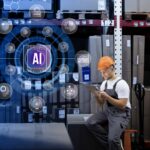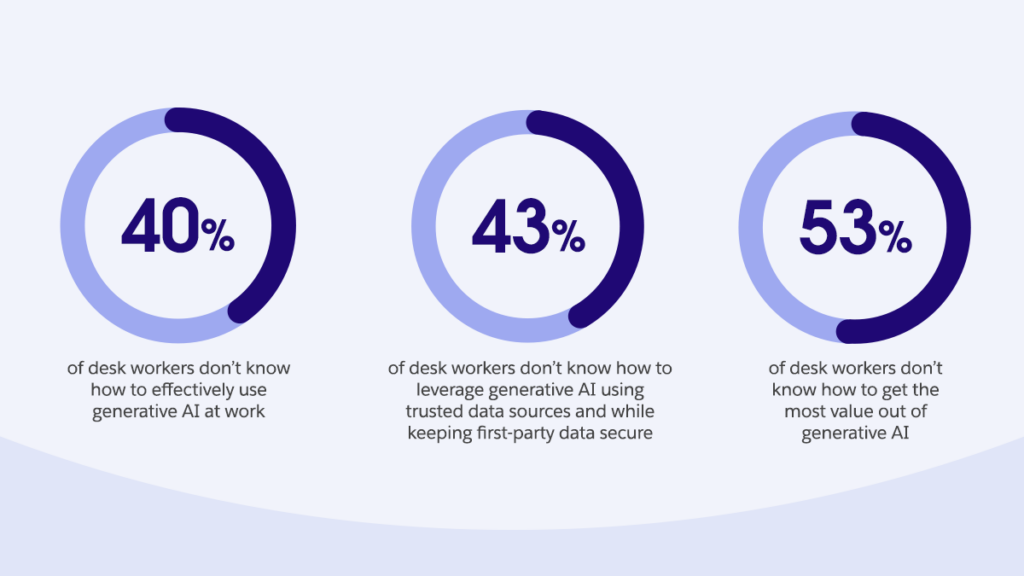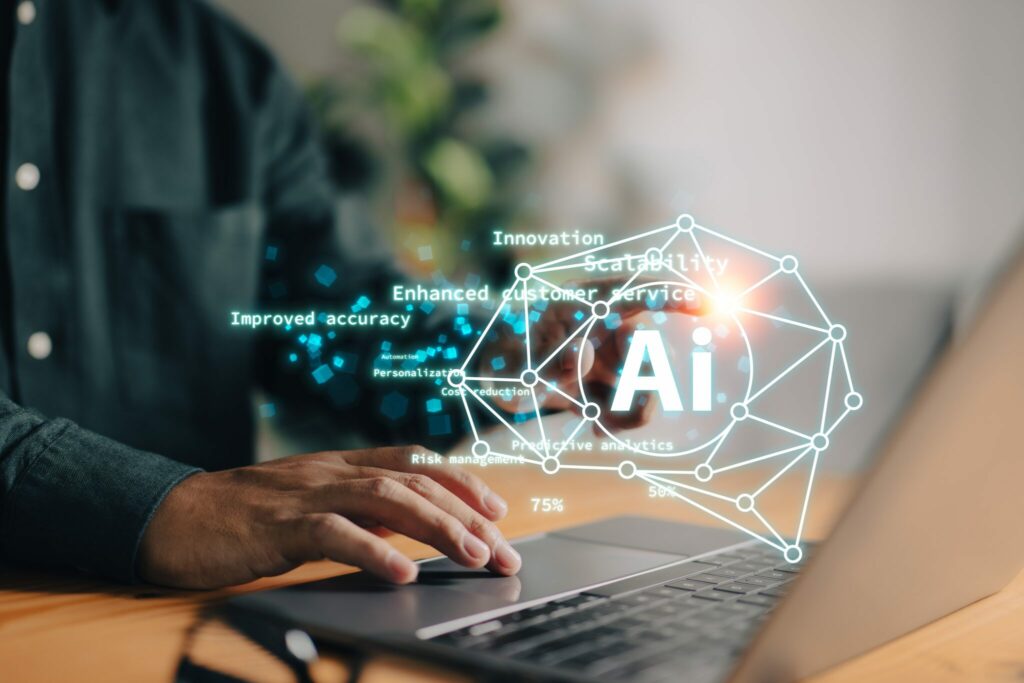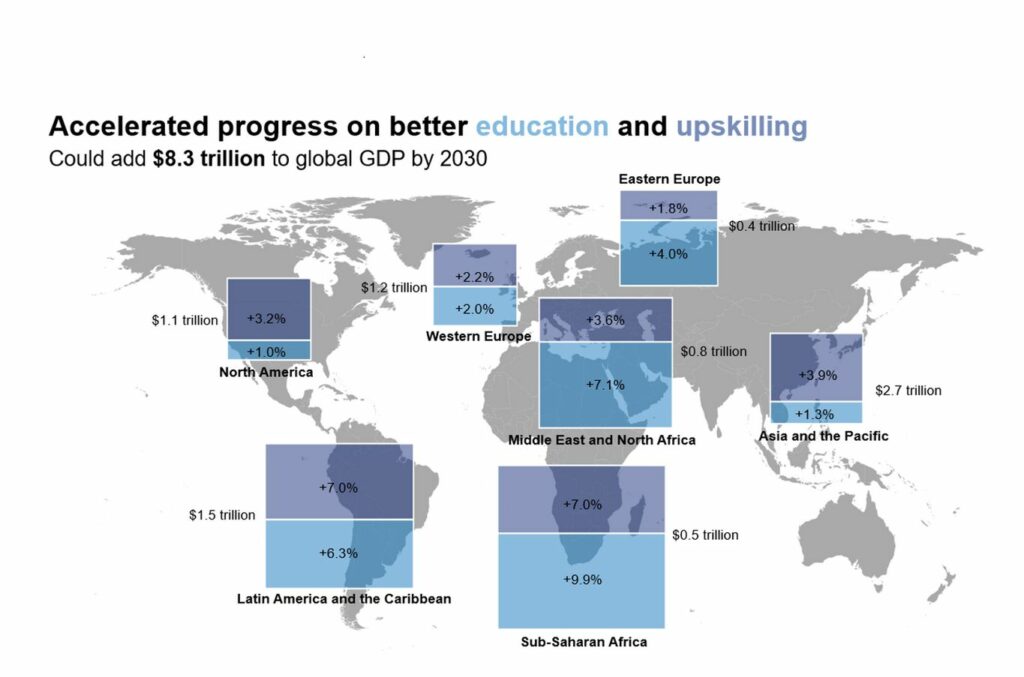
Aicerts News
3 months ago
AI Upskilling: The New Frontier in Future-Proofing Developers
This year’s exponential 20-fold rise in demand for generative AI skills signals a pressing need for AI upskilling to address the stark talent shortages in data and analytics initiatives. As the popularity of artificial intelligence surges, so does the imperative for a future-proof workforce proficient in AI certification and capable of embracing transformative technologies. In this article, we will learn about purposeful upskilling programs and certifications that would help businesses close the skills gap in AI.

AI SKILL GAP

The widespread adoption of AI will require significant reskilling of the workforce. Up to 40% of employees may need to learn new skills in the next three years to work effectively alongside AI, as per the World Economic Forum. This becomes an opportunity for businesses to create a more skilled workforce and close the AI skills gap.
Companies should view reskilling as a strategic initiative and leverage online learning platforms and partnerships to empower their employees and prepare them for the future of work.
Identifying Core Skills for the AI Age
In the swiftly evolving AI landscape, a strategic approach to identifying and nurturing core skills is essential. Here’s a breakdown:
Technical Proficiencies
AI Engineers must master programming languages like Python, Java, R, C++, and JavaScript. Key areas include Data Modeling & Engineering, Big Data Analysis, Machine Learning Models, AI and ML services, AI Deployment & DevOps, and AI Security. Industry leaders also emphasize the importance of Python, C++, JavaScript, Java, C#, and other languages for AI Developers, alongside skills in data pre-processing, exploratory data analysis, and machine learning model deployment.
Non-Technical Abilities
Soft skills such as creativity, collaboration, adaptability, and continuous learning are becoming increasingly vital. Critical thinking and problem-solving, along with domain knowledge, ensure AI professionals can apply technical skills effectively.
Advanced Knowledge
A deep understanding of advanced mathematics, algorithms, and neural network architectures sets apart proficient AI Engineers. Familiarity with services like S3 for object storage and Redshift for data warehousing, as well as IAM for access management, are also recommended by industry leaders.
For AI upskilling, professionals can engage in hands-on projects, online courses, workshops, and industry publications.
To stay ahead, AI certification can serve as a testament to one’s expertise and commitment to continual learning. For those seeking to enhance their credentials, exploring accredited programs can be a valuable step toward becoming a thought leader in this dynamic field.

Gartner Suggests a Systematic Approach to Reskilling
- Identifying and categorizing desired skills, conducting a talent inventory to pinpoint gaps, mapping skills to specific roles, drafting job descriptions, evaluating current teams, creating a skills development portfolio, and implementing and monitoring the programs.
- Collaboration with industry partners, nonprofits, and educational institutions can extend training efforts and widen talent access. AI-powered tools such as Numly can enhance the reskilling experience by providing personalized learning paths, skill recognition, mentorship, continuous feedback, and community building.
The strategic integration of accredited certifications within reskilling programs can serve as a beacon for professional development, signaling a commitment to continuous learning and adaptability.
Strategies for Effective Reskilling
To implement effective reskilling strategies, organizations must simultaneously focus on several tasks:
Identify your Talent Gap:
Finding skill shortages is the first step towards future-proofing your talent stream. To evaluate present and future needs, make use of techniques like market research, workforce planning, skills audits, and talent analytics. Consider outside variables like consumer expectations and technology. For instance, to future-proof your workforce and meet the increasing need for AI-related skills, ensure you have AI engineers on staff. You can effectively address talent demands and maintain your competitiveness in changing marketplaces by knowing the roles and talents that are essential to your business plan.
Align Leadership:
Change middle managers’ perspectives to support reskilling programs. Encouraging leadership buy-in guarantees a more seamless transition for retrained workers into new positions. Modify middle managers’ perspectives to back programs for AI upskilling. Obtain their backing to ensure the smooth integration of retrained staff members. Put the financial benefits of having an AI-savvy staff first, easing fears of disruption by presenting reskilling as a means of empowering the team. Tell successful stories that are relevant. Give management resources for coaching retrained employees. Acknowledge advocates and promote collaboration with cross-functional teams and open communication. Make managers advocate for AI upskilling to ensure a workforce ready for the future and a smooth transition.
Workflow-Integrated learning:
Incorporate skill development right into the process. Upskilling is made easier with this microlearning approach, which also reinforces new abilities through real-world application. This approach is more effective than conventional training approaches because workers might not have the time to participate, and they might not use their newly acquired abilities at work. The suggested remedy is to use learning meetings or contextualized training programs to integrate learning into the regular workflow—short prompts on content that has been taught help in retention. The application of knowledge is strengthened through reflection on it. Breaking down microlearning experiences into smaller pieces is beneficial. Finally, there is a focus on tracking the advancement of these learning initiatives.
Personalized Learning
Artificial intelligence (AI) improves individualized learning by delivering adaptable learning systems that modify content in real-time based on student’s performance and offer more exercises or resources as needed. Educators can take preemptive measures by using predictive analysis to foresee potential issues based on historical performance data. Moreover, AI makes it possible to create information that is specific to each learner’s learning style and proficiency level. HR can use AI to tailor learning paths for staff members, considering their goals and needs, to design development plans pertinent to them. This ultimately improves workforce skills and productivity by enabling people to adopt AI technology and move into higher-value professions.
It is crucial to align reskilling programs with the company’s strategy, ensure employees understand the benefits, and provide clear career progression paths. By pushing employees beyond their comfort zones and investing in their development, employers can play a significant role in the upskilling and reskilling process.
Case Studies: Success Stories of Reskilled Workforces
Infosys
Infosys provides AI upskilling to its employees through internal training programs and Infosys Springboard, a free public portal featuring courses in AI and ML. This emphasis on AI reflects its expanding significance in IT and attempts to improve employee skill sets, their capacity to provide AI solutions, and the company’s culture of ongoing learning. Infosys is creating a workforce that is future-proof and ready for the rapidly changing digital world by educating its employees about AI.
Vodafone
Vodafone adopted a cloud-based HR strategy in 2023 to prepare its personnel for the future. A 26% increase in recruits, a 19% increase in hiring diversity, and a 50% decrease in candidate wait times were the results of this tech update. Vodafone is developing an increasingly flexible and competent technical staff by prioritizing internal development.
Amazon
Amazon has taken significant strides in AI education through its Machine Learning University, which has transformed thousands of its employees into machine learning experts.
PWC
PwC’s substantial $3 billion investment in job training underscores its commitment to employee development. They call on all individuals to “upskill,” which goes beyond simply using new tools. It is about approaching ethical problems in the tech industry, thinking critically, and adjusting to change. To close the “digital divide” and build a future in which everyone prospers in the digital age, they see a need for cooperation between governments, corporations, and educational institutions.
Unilever
Unilever automated recruitment with AI, which reduced hiring time from months to weeks and ensured a more diverse candidate pool.
IBM
IBM uses AI to provide individualized learning programs for its employees. AI evaluates a worker’s output to determine their strong and weak points before considering the business’s present and future skill requirements. The AI uses this data to create individualized learning routes that target each employee’s unique gaps and support the objectives of the business. These routes could include online classes, in-house training courses, or mentorship opportunities, guaranteeing that staff members have the specialized knowledge required to stay current and advance their careers at IBM.
Accenture
Accenture curated personalized learning paths for employees, boosting engagement and skill development. These case studies illustrate that investing in AI upskilling is not only beneficial for the workforce but also aligns with the strategic business goals of these companies.

Takeaways
- AI skills are in high demand, and there is a talent shortage in data and analytics.
- Developers need to upskill themselves in areas such as programming languages, data modeling, machine learning, and AI security.
- Soft skills such as creativity, collaboration, and critical thinking are also important for AI professionals.
- Companies can reskill their employees by providing them with training programs, online courses, and hands-on projects.
- AI certification can serve as a testament to one’s expertise and commitment to continual learning.
Conclusion
The evolving tech landscape demands a future-proof workforce. Upskilling your team isn’t just about individual development; it’s a strategic investment. By equipping your employees with the latest AI knowledge, AI-certified professionals don’t just adapt to change; they lead it, pioneering new solutions and driving your business forward.
Equip your developers for the AI revolution. The AI+ Developer™ Certification by AI CERTs™ reskills your workforce to design, deploy, and manage ethical AI solutions. Click here to enroll now or contact us at contact@aicerts.io for more information.